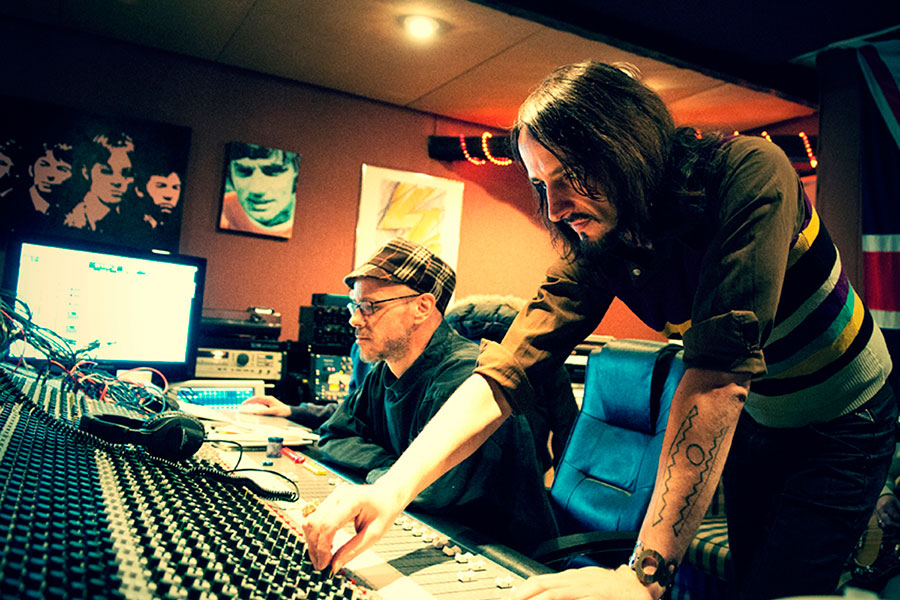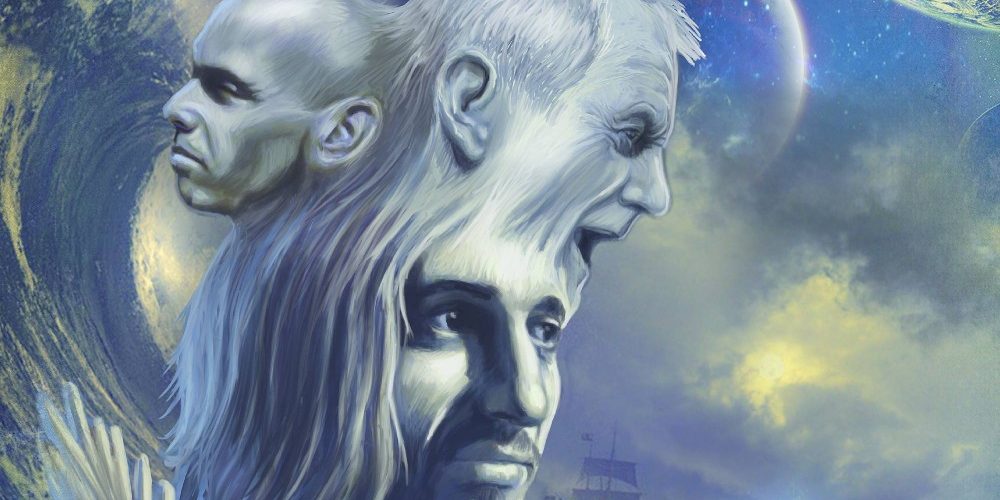The Amorphous Androgynous on the ‘lost’ Noel Gallagher album: “I may or may not still be working on bits”
As Amorphous Androgynous release a new 40-minute track, Garry Cobain from the duo has spoken to NME about his musical journey so far and the fate of material recorded with Noel Gallagher.
The duo – Cobain and Brian Dougans, who also operate as Future Sound Of London –worked with Gallagher as producers and songwriters on a ‘space rock’ album before he ditched the record in favour of the High Flying Birds’ debut in 2011.
Gallagher previously called the record “underwhelming” and “a bit shit” while claiming to have destroyed the masters, before then revealing that he’d found them in a sock drawer in 2018. While admitting that “it might be nice to go back and revisit it in years to come”, the former Oasis songwriter said that the album “won’t be coming out any time soon”.
Now, Cobain has told NME more about what became of the material, as well as the inspiration behind their new 40-minute multi-part rock odyssey ‘We Persuade Ourselves We Are Immortal’ – finally released after 20 years in the making. Described by Garry as “‘70s Floyd devotional”, it features appearances from Paul Weller (whom AA had worked with around 2010 on music that became ‘White Sky’ on ‘Saturns Pattern’) and Van Der Graaf Generator’s Peter Hammill. It began life as a series of samples Garry pieced together inspired by hearing Pink Floyd’s ‘Comfortably Numb’ during an acupuncture session in 2002.
“I’m a great believer in the production process,” he told NME. “You have to trust that things come together in the right time. If you try to force things they don’t come out so well, so there’s a different pace to allowing things to unfold and I really trust that process. Sometimes, unfortunately, it can take fucking years, for the right player, the right permutation of people to realise a track.”
Hello Garry. Is this release the culmination of everything you’ve wanted to do with Amorphous for 20 years?
Cobain: “Yeah. Our vision is that it’s not a prog band or a psych band, it’s a monstrous psychedelic bubble, which is like everything goes in the juxtapose. ‘Monstrous Psychedelic Bubble’, those compilation albums, were a template for a vision for something that encapsulated technology and production – but it was about the spiritual and the yearning of the soul for something more in balance rather than getting sucked away into isolated technology. We weren’t really into the historical lineage of psychedelia from 1966 to ’90, we just think there’s a new freedom coming.”
Is the track trying to say ‘we are immortal’, or we believe we are?
“The meaning of it has changed over the years. At the time, with some of my mysticism interests, what I was getting at was that only by facing our mortality do we fully live. There’s a fear of death, and accepting mortality is a natural part of life’s cycle. But if you’re gonna walk around every day scared shitless of everything, you’re never really living. That’s kind of the hypnotised state we’ve been led into. There’s so much fear porn in life that we’ve been pulled completely away from how incredible the human body is and the super-computer of nature and our place within it. In the present day, it’s become a whole bunch of meanings. I don’t think it would’ve been finished unless it was for what was happening now, because that also really shook me up – people think they’re facing their mortality now.”
As the band who pioneered touring remotely from your studio in the mid ‘90s, has technology caught up with you at last?
“We were two punks with a sampler, let’s get it in context. We used to go, ‘We’ve got a spaceship, we’re really technological’, but we did everything ourselves, we made our own videos and we had an old gaming computer. We were [ahead] to a certain degree, in terms that we were introducing a lot of artistry into an old Pac-Man computer. We played our part but we wouldn’t have meant anything unless the music had an emotional [impact]. Technology does not interest me, it’s a tool. The soul being infused – that stuff meant something.”

So what do you think of the technological landscape of now?
“With my own issues I discovered so much about health, spiritual health, love, joy, biology and ancient forms that I didn’t want to rush towards the future. I began to be aware of the fact that we could quite easily be used just to sell hardware and to sell our vision of the future. There is potentially an agenda to the future that I didn’t necessarily like. I didn’t like the idea of becoming a digital commodity online where I’m harvested and you’re feeding that information to what’s called a digital twin of you so they can basically predict you and what you’re gonna do and what you’re gonna choose. These things are actually happening right now.”
What happened to the album you did with Noel Gallagher?
“He hasn’t destroyed the masters because I’ve got them, haven’t I? Of course! How has the producer who made the record alone in a room for 18 months and only worked directly with Noel for three weeks not have the masters? I wouldn’t release somebody else’s music because he’s paid for it, but I may or I may not be still working on bits – interesting question.”
How far out did the record get?
“I’m used to really battling to get things through the final hurdles. It required the kind of artistic process that I’m used to, but when you’re dealing with the chief songwriter of Oasis who’s got his own ways of producing things, it took a long time to get over those hurdles. It’s gonna be very different to the way he does it. It wasn’t our album so it was like, ‘We’re making an album for you, remixing, putting different backing around your songs, collaborating directly with you at points’, but then I delivered that work with loads of forks in the road.”
And then it all came to a halt?
“He basically went on tour and we never got to do the final mixing. To me, that’s more of a mystery than anything else. It was really wild and it’s a real shame because it wouldn’t have taken that much more of a relationship. There was some art, it got to almost being finished and I think it’s a real fucking shame. It’s still sitting there and it’s still extraordinary. I think people would love to hear it.”
He said he felt like he was making a record for you…
“Absolutely not. I couldn’t be more co-operative if I fucking tried. My job as a producer is to try to gently encourage people to surprise themselves. I’ve got better at that [but] I wanted collaboration [in a way] that maybe he wasn’t prepared to be collaborative. The truth is I think he thought we were gonna remix his songs and we weren’t gonna push collaboratively. The absolute opposite actually happened. I became the producer and I got really involved with him deep down and dirty, started trying to illicit deeper performances from him and I got them on some occasions. I think he even surprised himself. We got in a room with him, we pushed him, we argued with him.”
So it felt collaborative to you?
“I was very collaborative. We had the odd little argument but generally we were really buzzing. I was DJing at his album launch, he came over to me at that party and said ‘I’m gonna finish the mixes on these, it’s gonna be the second best rock album of all time’. Then I start to get bad-mouthed in the press, but I don’t really hold him much malice. Take it from me, the record is great, a lot of work was done, he was inspired by it.”
Have you fallen out?
“No, we’ve not fallen out at all. The way I view this is that it’s a relationship. As a producer you have to work with the person you’re with and I could’ve done better at that. So I’ve learned from it. I love Noel, I don’t agree with the way he’s handled some of it, but I understand – he makes his decisions that work for him at that point. I sat with him in a room, I’ve seen him surprised by what he can do when he’s inspired in a slightly different way.”
‘We Persuade Ourselves We Are Immortal’ by Amorphous Androgynous is out now.
